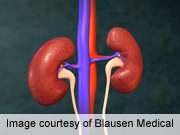(HealthDay)—Use of atypical antipsychotic drugs is associated with increased risk of acute kidney injury (AKI) in older adults, according to research published in the Aug. 19 issue of the Annals of Internal Medicine.
Y. Joseph Hwang, from the Case Western Reserve University School of Medicine in Cleveland, and colleagues analyzed data for 97,777 adults aged 65 years or older who received a new outpatient prescription for an oral atypical antipsychotic drug. These patients were matched 1:1 with a group of individuals who did not receive such a prescription. The authors sought to assess the risk of AKI and other adverse outcomes with the use of these agents.
The researchers found that risk of hospitalization for AKI was higher among older adults who used atypical antipsychotic agents compared with those who did not use these agents (relative risk [RR], 1.73; 95 percent confidence interval [CI], 1.55 to 1.92). When data were analyzed for a subpopulation of patients for whom information on serum creatinine levels was available, this association was consistently observed (5.46 versus 3.34 percent; RR, 1.70 [95 percent CI, 1.22 to 2.38]; absolute risk increase, 2.12 percent [95 percent CI, 0.80 to 3.43 percent]). Use of atypical antipsychotic drugs in older adults was also associated with increased risk of hypotension (RR, 1.91; 95 percent CI, 1.60 to 2.28), acute urinary retention (RR, 1.98; 95 percent CI, 1.63 to 2.40), and all-cause mortality (RR, 2.39; 95 percent CI, 2.28 to 2.50).
"The findings support current safety concerns about the use of these drugs in older adults," the authors write.
More information: Full Text (subscription or payment may be required)
Journal information: Annals of Internal Medicine
Copyright © 2014 HealthDay. All rights reserved.
























